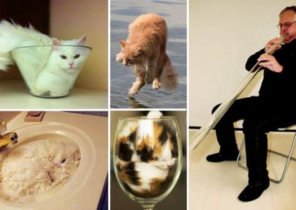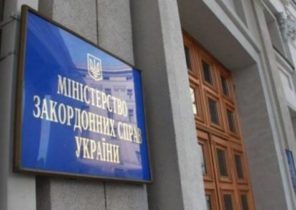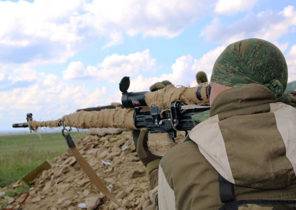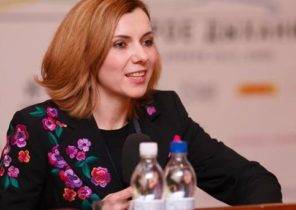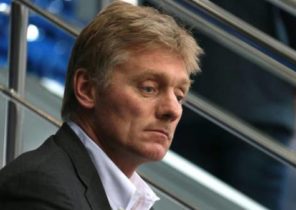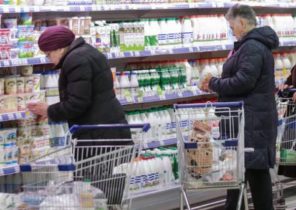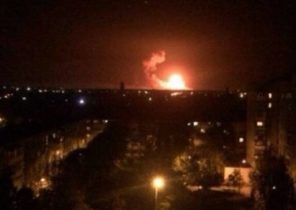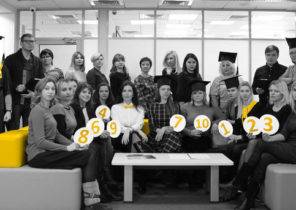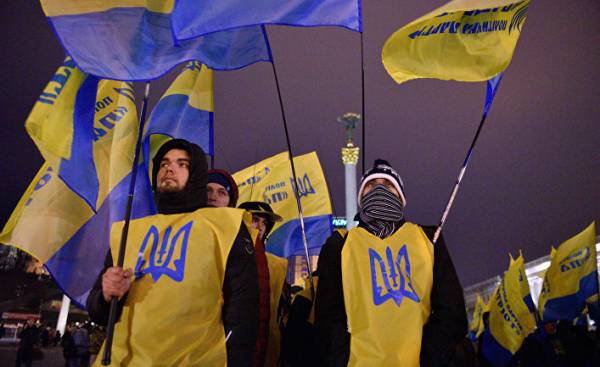
“In most countries, the shock of war, humiliation of defeat and an open wound from lost territories has been a powerful tool for national solidarity and the formation of a strong national identity. The partitions of Poland in the second half of the XVIII century erased the Polish state from the map of Europe, but served as a starting point for formation of modern Polish nationalism, while Napoleon’s invasion of Germany in the early NINETEENTH century gave impetus to the development of pangermanic ideas and contributed to the development of modern German nationalism. Memories of defeat and loss of territories fueled the national feelings of the French and poles, Serbs and Czechs. Ukraine has been invaded, humiliated and section the war seems to follow this General model”, is one of the key theses of the book “the Gate of Europe. History of Ukraine from the Scythian wars to independence”. Its author, Sergey Bad, famous Ukrainian historian, Professor at Harvard University. In 2015, he wrote a summarized history of Ukraine, to explain to Western readers the past of the country, in which occurred the Revolution of dignity, and then Russia went to war.
Three and a half years of armed confrontation of the Imperial Moscow confirmed the correctness of the conclusion of the scientist: the national solidarity and national identity of the Ukrainians created the Foundation to successfully stop the Russian aggression and the first significant achievements on the way of Ukraine towards integration with the EU. In the crucible of war really is born a new Ukrainian nation.
However, for Putin and his propaganda, the Russians and the Ukrainians are still “one nation”, and until this setting is changed, until then no chance for peace. The Kremlin will continue to believe that the destruction of the Ukrainian state and the Ukrainian nation — the goal is achievable. Just need to wait for a social explosion on the Dnieper, and “Russian Ukraine” (or “new Russia” and “Ruthenia”) EN masse take to the streets with slogans: “Putin, come!” And then he will have a chance to implement a plan that failed in 2014
Sociological studies show that the calculations of the Kremlin strategists rely on them as fictional reality. In March 2017, four senior Ukrainian sociological center (KIIS, Rating, SOTSIS and the Center. Razumkov) has conducted extensive public opinion survey, which was attended by 14 thousand respondents, 500 in each region, and in Kiev, Kharkov and Odessa regions — 1 thousand. Region, in addition to these, United in large regions, to reduce the margin of error. After all, Ivano-Frankivsk, Lviv and Ternopil region — is a reference to the West: Volyn, Rivne and Zhytomyr regions — North-West: Zakarpattia and Chernivtsi — South-West; Vinnytsia and Khmelnytsky — Podolia, Kiev, Sumy and Chernigiv — Sever; Kirovohrad, Poltava and Cherkasy Center; Nikolaev and Kherson — South; Zaporizhia and Dnipropetrovsk — East; unoccupied territory of Donetsk and Lugansk regions, the Donbass.
The results of the survey to create a map of the public sentiment of the Ukrainian community in the beginning of the fourth year of the war and on the eve of visa-free regime with the EU. In the present paper we decided to present the results of a survey on national identity, everyday language, confessional questions, the attitude towards the EU and NATO, that is the problem, for years used by Russia as an element of a hybrid war against Ukraine, and correspondingly, for decades, been an element of political confrontation in Ukraine itself. Based on an in-depth analysis of survey data we tried to generate insights about the influence of public attitudes on public policy, and tried to put social processes in Ukraine in all-European context. I hope that our publication will stimulate discussion and debate.
The first statement is a radical increase in the number of people who declared Ukrainian national identity. For comparison should result in data on the ethnic composition of the population of Ukraine according to censuses of 1989 and 2001: the Ukrainians -72,7 and 77.8%, respectively -22,1 Russian and 17.3, other from -5.2 to 4.9%. Today the national structure of the population of Ukraine, undoubtedly, has affected Russia’s annexation of Crimea and occupation of a significant part of the Donbass, regions with a traditionally high percentage of ethnic Russians and representatives of other national groups. According to the census of 2001, ark lived ethnic Russians 58,3%, Ukrainians — 24,3, Crimean Tatars, and 12.3, other -5,1%. In Donetsk region there lived Ukrainians accounted for 56.9%, Russian — 38.2, representatives of other ethnic groups was 4.9%. In Luhansk oblast: Ukrainians — 58%, -39 Russian, others — 3%. Thus, a sharp decrease in the number of people this year declared Russian or other national identity, occurred not only due to the occupation of ethnically non-Ukrainian territories as the occupied territories were not only Russian, but also many Ukrainians.
Sociologists say that people have a somewhat different answer to the question about their nationality during the census (declaring “blood”) and in the process of opinion polls (the political definition of national identity/nationality). However, in our opinion, the scale of this phenomenon does not affect the overall picture, which illustrates the comparison of the results of the population census in 1989 and 2001: for the first ten years of independence decreased the number of Russian (22%) and several other ethnic groups, but the increase in the number of Ukrainians (7%). Independence was facilitated by identification with the Ukrainian nation, particularly in the South-Eastern regions. This process was accelerated by the war, what convinces comparing the above data of the opinion poll conducted in March of this year, with census 2001 in Dnepropetrovsk and Zaporozhye (East), Nikolaev and Kherson (South), Odessa and Kharkiv regions. The percentage of those who declared Ukrainian nationality, has increased by 12-19%, the highest share in the Kharkiv region, where the number of those who declared Russian nationality decreased by 46%.
The respondents were asked in which language they communicate at home. The results of the survey show that after a significant increase in declarations of Ukrainian national identity similar changes in language practice not occurred. People with this point of view, conservative and not prone to changing generally accepted practices. But symptomatic of the situation in Kiev, where for the first time people who at home speak only the Ukrainian language, became more than those who communicate only in Russian. The largest group is those who use both languages.
The Respondent asked the best way to solve the language problem in Ukraine. If you combine those who are for Ukrainian as the only state language, and anyone who wants to at the local level were allowed to use Russian and other languages as official, it can be stated that the vast majority (80%) of Ukrainian society does not support speculations on the language issue. Only a fifth of the wants of the introduction of two state languages. Moreover, a total of the first two of these three categories dominate in all regions. The exception is the non-occupied areas of Donbass, where a few predominate supporters of granting the Russian language the second state. Thus, we can say that the language issue in the Ukrainian society close to achieving a broad consensus on the legal definition of which is between the words of “free use of Russian and other languages” and all these languages at the local level non-state status.
Respondents were also asked about religious affiliation. Respondents who declared belonging to the Orthodox faith, raised the question, to what kind of Orthodox Church, they rank themselves.
Analyze the results confirmed the results of other sociological research: the most Orthodox declare belonging to the UOC-KP (27% of all residents of Ukraine), the second category is “simply Orthodox” (21), and only third by number of the group of believers of the UOC-MP (17%). In the social dimension of Orthodox Ukraine are ready for autocephaly, because the recognition of the particularity of the UOC, the recognition of the autocephaly of the Church is a separate element of recognition of state independence, and therefore there is no argument that this principle did not apply to an independent Ukraine. Except, of course, an argument for the “triune of Holy Russia” and “Russian world”, but it is an ideology of military aggression against Ukraine. After the pan-Orthodox Council (June 2016) disappeared last argument against: the need to preserve the unity of the world Orthodoxy. The Moscow Patriarchate and those close to him of the Church did not participate in the Cathedral, and themselves broke this unity. And faithful of the UOC-MP, the state must guarantee freedom of religion.
The strategic goal of the Ukrainian state to gain membership in the EU and NATO. Recall that the survey was conducted in March, when there was no certainty that Ukraine will receive bezviz, and the Parliament of the Netherlands ratified the Association Agreement EU-Ukraine.
The strategic course of the Ukrainian state in European and Euro-Atlantic integration is based on a solid Foundation. In the whole of Ukraine is dominated by the adherents of Ukraine’s membership in EU and NATO, although membership in NATO is not as popular as the EU membership. Supporters of EU membership are more in all regions except Kharkov and Odessa, and the Donbass. It should also be noted that, with the exception of the Donbas and Odessa region, the number of adherents of NATO does not fall below one third of the inhabitants, which gives a reliable basis for the work with the rest of the citizens.
In addition to the study of regional classifications, we were interested in the views of respondents in terms of age groups. The answer to the question: “are Traced in Ukraine whether the differences in the generations?” vygldit: age of respondents most significantly affects the support of the foreign policy orientation of the state: support of the EU and NATO among young Ukrainians is much higher than among the elderly. And, tellingly, for the selected five age groups, the progress of this support line. Similar progress can be seen in the national identity of the younger, the more often he identificeret themselves with the Ukrainians. But in matters of language and religions between individual age groups no significant differences. It should be emphasized that the younger generation is less use Ukrainian language.
The state mono-type
Given a Professor a Bad historical perspective led us to try to look at the current social processes in Ukraine is broader than the findings of opinion polls. Deeper social processes (and these include issues of identity and foreign policy orientation) allow to identify the basis of political phenomena, to understand the framework in which policies operate, and to better understand the results of their decisions. Moreover, important European perspective and, needless to say, the confrontation of the Ukrainian social reality with the strategic goals of the Kremlin.
Ukrainians have become one of the most homogeneous societies in Europe, taking into account the national identity of citizens of Ukraine. However, the modern Ukrainian national identity is open, not closed, attractive and dynamic, since the ability to assimilate people identifying themselves with other ethnic groups or “blood” belonging to others. So, according to classical political science definitions, the Ukrainian national process (in political science called nationalism) ethnically inclusive and not exclusive.
In simple terms, the Ukrainian nation is growing, because no one in the birth certificate up to the fifth generation looks, but who wants to look, the friend of Putin.
In the history of Ukraine and the Ukrainian nation is not a new phenomenon. Among the petty officers of the elite of the Hetman state were ethnic non-Ukrainians, such as Pylyp Orlyk. Among the “founding fathers” of modern Ukrainians — a lot of outstanding persons of non-Ukrainian ethnic origin, to recall, Mykola Kostomarov, Volodymyr Antonovych, Vyacheslav Lipinski, agatangel Crimean, Solomon Goldelman, Algirdas Bochkov and many others. UNR and ZUNR was built on civil, not ethnic principle. Ukrainization of the 1920-ies showed great potential for expansion of Ukrainian identity in the Russian-speaking cities and industrial centers. Similar processes occur today.
In this respect, Ukraine integrated into the European processes. Anthony Smith, the famous British Explorer of the national processes (died last year), in his classic work “Nation and nationalism in the global era” (English edition 1995) noted: “the Influx of a large number of immigrants, migrant workers, refugees, ex-coloniales and strangers undoubtedly changed the current nature of French, British or Dutch “national identities”. They can no longer be described is simple, relatively homogeneous categories, characteristic of the prewar period. Although these changes in national identity have forced the national States to pereobuchitj some of its roles and functions, they have not led to a reduction in their sizes and powers.”
He also stated that “from a sociological point of view, the range of nation-States is considerable. At one extreme are national States, which more or less dominates the ethnic -, — Poland, Denmark and Sweden; at the other, ethnically deeply divided nation state, like Belgium, Canada, Lebanon, Nigeria, Zaire, Angola, India and Pakistan. Between many nation States with a dominant ethnic core, but with one or more significant ethnic or national minorities, such as China, Vietnam, Indonesia, Burma, Iran, Egypt, Zimbabwe, Algeria, Mexico, Peru, Spain, France, Britain, Romania, Bulgaria and Georgia”.
Ukraine didn’t have to take hundreds of thousands of refugees from the Middle East to think about their inculturation and compete with the political forces to build support on fear of refugees. But the Ukrainian government must “parasykite some of its roles and functions are” to stand against aggression. After three years, this “override” it can be stated that post-revolutionary Ukraine is rapidly approaching the model of the nation state with a dominant ethnic core of the Ukrainian nation. It becomes a single-nation state, but is bilingual, with a significant percentage of members of other ethnic groups, and multi-religious.
The paradox of enterprises that are not merged?
Combined, but specific for Ukraine, because everything should be done simultaneously: 1) to survive the war with Russia, which is “the competition of identities”; 2) deep to rebuild/reform the government, a prerequisite of which is the preservation of the society’s consolidation around key public policy objectives; 3) be decolonized status of the Ukrainian culture, its language situation and to radically change the situation in the media space. And all this is done respecting the fundamental rights and freedoms of the citizen. The task is indeed Herculean, and no room for error.
Also important is the historical perspective: the modern history Ukraine has never been independent for such a long period of time (26 years), has never confronted Russia in the armed conflict for so long, and never Ukraine was not so deeply integrated into the European political process. And never approached the status of a subject of world politics, with the possible exception of the second half of 1991, when the Ukrainian referendum put an end to the Soviet Union, contrary to the position of the leadership of not only the USSR but also the USA.
Note that the leaders of the Ukrainian state formations, national liberation movements and political parties of the twentieth century could only dream that the Ukrainian issue will be resolved in the Donbas, not in Kiev or in Lviv. Would thank God or fate for the fact that in the crucible of war with Russia by its own forces, Ukrainians will create an army, saved the state and the United nation. Therefore, it is important not to go with historical figures, as with the shafts, the political opponents, not to divide Ukrainians into “real” and “fake”. Patriotism is a measure of the relationship to the current challenges of the Ukrainian “to be or not to be”. It is necessary to Putin, to Ukrainians and other peoples of East Central Europe was plunged into a conflict of 30-40-ies of the XX century and symbolically chose between Stalin and Hitler.
“Will always protect“
There will never be enough to say that Putin and his entourage, the Orange revolution was a genuine shock. “Color revolution” occurred in the state in which she wasn’t supposed to happen: built on the Russian model (oligarchy and ensure continuity of power through the mechanism of the definition of “heir”); the dependent from the Russian “pipe”; to corrupt; with “multi-vector” foreign policy that, it seemed, would have to guarantee its gradual entry into the restored “Union of fraternal republics.” And above all, the “consanguineous”: “17 million of the Russian population” (my favorite argument of Putin), a predominance of the Russian language in the cities (with the exception of Lviv), a powerful Russian Orthodox Church and the media space that is fully integrated with Russia.
In 2004 came out, therefore, to develop a strategy for the solution of the Ukrainian question was involved sociologists, history and military. The war against Ukraine was supposed to start “redrawing” of the results of the collapse of the Soviet Union (Putin “the greatest geopolitical catastrophe of the twentieth century”) and the establishment of a new world order with a restored Russian Empire as one of the two hegemons. Kremlin strategists that wasn’t enough, so conceived, together with a “catastrophe of the twentieth century” “to cross” and “catastrophe” of the previous century: the collapse of the process of formation of the “great Russian nation”, which was to consist of three tribes: great Russian, little Russian and Belarusian. For Ukraine, this plan is meant not only the loss of state independence and the partition of the country, but also the disappearance of the Ukrainian nation as such.
In 2000, Alexei Miller, the famous Russian historian, published a book on the “Ukrainian question” in politics of the tsarist government and the Russian public opinion the second half of the NINETEENTH century His conclusion: “the Failure of the great Russian nation began in the first place, so often mentioned Katkov [Michael, editor of the ultraconservative “Moscow news”] and his followers “Polish-Austrian-German intrigue”, but intrinsic limitations of the Russian assimilation potential in the inability of the state and supporters of the all-Russian project in the community to coordinate their efforts to mobilize the available possibilities for its implementation and for defending the already achieved from the challenge of competing Ukrainian project. The “window of opportunity” was not used, and a severe political crisis in Russia in the first decades of the twentieth century and its consequences are buried, among other things, the project of the great Russian nation”.
“Rising from its knees” Empire Putin decided that the project is not buried. Kremlin strategists went to great strength to make full use of the “assimilation capacity” of Russia, “coordinated the efforts of the state and public institutions” and “mobilized all available resources”. The script included the creation of eight South-Eastern regions of the “new Russia”. The Central part (“Zbruch”) was supposed to be “Little Russia”, which was controlled by Yanukovych, or someone like him. For Galicia, Volhynia, Bukovina and Transcarpathia issued in two versions: the accession of Poland, Romania and Hungary, respectively (according to the belonging of these regions before the Second world war), or they had to wait for the fate of Chechnya and Aleppo.
Three years ago in the European press discussed the information that Putin is already in 2008-2009 suggested that the leaders of the Western neighbors of Ukraine to take part in partition of Ukraine, in the spring of 2014 the offer was made publicly of the building of the State Duma of the Russian Federation. If she was adopted, Russia would have allies in establishing a “new order”, but from NATO and the EU would not remain and a trace. Because in the democratic world cannot exist interstate unions, individual members of which destroy the foundations of the international order.
In case of rejection of the proposal of the Kremlin, Russia would have free hands to “dill” and “Bandera-fascists” to exterminate to the last. And who after such an operation was still alive, would be “Ruthenian”, to once and forever end the “Ukrainian disease of the Russian nation”. During such an operation, Poland, Romania, Hungary, Slovakia, Czech Republic and Germany would have caved in under the burden of problems with millions of Ukrainian refugees. And in order that nobody did not, among them there would be terrorists in the place where the terrorist attacks had “Yarosh business card”. As a result, would never, and no one would dare in a positive context to mention the word “Ukraine” and “Ukrainians”.
In the so-called Crimean speech on March 18, 2014 (justification of the annexation of Crimea), Putin said: “We are one with Ukraine people. Kiev — mother of Russian cities. We will not be able to live without each other. Ukraine will live and millions Russian citizens, and Russia will always defend their interests”. On March 18 of next year elections of the President of the Russian Federation — as a sign that scripts written for 2014, remain valid. Inspired by the prospect, the radical right-wing forces, the Western neighbors of Ukraine openly proclaim the slogan “the great” of Hungary, Romania and Poland, “entitled” to their “eternal earth”, which “temporarily occupied Bandera Ukraine”.
Keep mind
Putin and his entourage do not perceive neither the modern world nor of the will of the Ukrainian society to normal life. They are on a subconscious level do not recognize the Ukrainian nation — focused on Europe, modern with a large, still unused potential for modernization. And so the threat posed by Putin millions of Ukrainians felt at the level of social instinct: to stand against the aggression, necessary between themselves and the “Russian world” to put up a wall and to build their own “world”. The Ukrainian government is obliged to respond to the request, and must invest it in a legal framework.
Jose Casanova, a well-known researcher of religion and of secularization, said: “Since the end of 1980-ies, when in Ukraine there was “glasnost”, there arose the most diverse, the most pluralistic and the most competitive in continental Europe religious system. Even more: in fact, Ukraine is the only country in Europe that departed from the European model of a national Church (or national churches) and religious minorities or “sects” and closer to the American model of religious denominationalism. Institutionally, the fundamental is the fact that we are talking about a system of mutual recognition social groups without their recognition or regulation by the state.”
Today the political problem in Ukraine — the answer to the question of how the state needs to preserve diversity and pluralism and to regulate the state mechanism so that the society has not become a battlefield of all against all. To survive the war with Russia and to prevent the creation of an “internal front”.
In Ukraine, a consensus regarding the foundations of statehood: Ukraine is a unitary state in which the development of the local self-government; the bearer of sovereignty and the only source of power in Ukraine is the Ukrainian nation, i.e. “citizens of all nationalities” (preamble of the Constitution of Ukraine); the Ukrainian language is the single state, other languages are guaranteed free development, use and protection; the Crimea is the national autonomy of the Crimean Tatar people with the safeguarding of the rights of other nationalities; the vast majority of politically active Ukrainians supported the integration with EU and NATO, in particular the younger generation.
The most delicate is the language problem: to insist with the state on changing the status of actual bilingualism and accelerate “positive discrimination” of the Ukrainian language? The answer brought life itself: the growth of Ukrainian national identity slowly changes the language practice that illustrates an example of Kiev, where a growing proportion of those who use the Ukrainian language in daily communication. The main thing — to preserve moderation, reason and not to force the process. Residents of the East and South of Ukraine have stopped the spread of the “Russian spring” in 2014, because they are able to choose their own life.
“Ukrainian Ukrainians” it’s time to get used to the fact that they — the vast majority in state and, therefore, carry with it special responsibilities. Should not behave like centuries humiliated minority, and like most, aware of their rights, and, above all, responsibilities. Ukrainians diverse and pluralistic, and this is its great strength. It is also important to understand that the Fly will sink the common is still a cliché, as a “split country”, “civilizational frontier on the river”, “little Russians” in the East, which do not give to live “real Ukrainians” from the West.
Freedom and dignity
In Europe, do not cease debate about the role of nation-States and nationalism as an element of social modernization. The debate intensified globalization and the crisis of the EU, which oscillates between disintegration and transition towards a closer form of Association. Elections in the Netherlands and France turned the tide in favor of the second scenario, so we can predict that after the September elections in Germany, the EU finally choose further integration, in particular the deepening of institutional cooperation in the Eurozone. Does this mean the withering away of national States and a serious step forward towards creating a European “sverhnatsii”?
Smith foresaw that although the process of European unification will lead to the emergence of a European identity, “we are unlikely to ever have to witness the rapid demise of national communities, which are based on a common history and a common destiny, with their promises of collective immortality through the judgment of posterity. Without common memories and meanings, without all the obvious symbols and myths, without shrines, ceremonies and monuments, with the exception of the bitter reminders of the Holocaust and wars — who will feel European in the depths of his nature, who willingly sacrifice themselves for so abstract ideal? In General, who would die for Europe?”
First for the sake of Europe gave their lives the heroes of the Heavenly Hundred. In the first half of may 2017 in Brussels opened Museum of the history of the European Union, where the beginning of the story is the French revolution of 1789 with its slogan “Liberty-Equality-Brotherhood”. The orange revolution was held under the slogan of freedom (“Freedom cannot be stopped”), Euromaidan was a Revolution for dignity. November 22, Ukraine celebrates the Day of freedom and dignity. Freedom and dignity of all Nations and every person here is the formula of the Ukrainian revolutions, the integration of Ukraine in the cultural space of Europe and the value Foundation of the reborn Ukrainian nation and state. Heroes of hundreds of Heaven represented all regions of Ukraine, spoke different languages and had different ethnic origin.
The Russian anti-democratic and anti-liberal BacktothePast (back in time) has significantly altered the ideological landscape of Europe and the foreign policy priorities of the European political elite. The main allies of the Kremlin have become radical group and, unfortunately, the moderate right-wing. Their goal: to destroy the EU and NATO, so that their ruins “blossomed” national state of the sample in the 30-40-ies of the last century. Authoritarian, ideological, nationalist, or openly fascist.
Action generates reaction. Over the past three years, the allies of Ukraine was the European Christian Democrats by Angela Merkel and Donald Tusk, the liberals and American Republicans with John McCain. The allies were also European and American left-wing and green. A small “revolution” occurred in the politics of the French socialists françois Hollande and the German social Democrats, when they were headed by Martin Schulz. They have traditionally been closer to Russia than to Ukraine. Close to them On the macron, the new French President, a former Minister in a socialist government. And his new party “Forward” plans to join the Alliance of European liberals and Democrats.
To save a Pro-Ukrainian coalition crucial reform of the state, the development of the Armed forces and compliance with Ukraine Minsk agreements. But no less essential critical thinking political traditions: from the center right to the left. The continuity of democratic, Pro-European traditions facilitates the process of consolidation of Ukrainian nation and is a Testament to the maturity of political thought and political life of a product is particularly required in the modern world.
In 2003 Leonid Kuchma has issued the book “Ukraine — not Russia” — a political Manifesto of Ukrainian separateness within the paradigm of “fraternal” States and peoples and diversity of Ukrainian politics. Russia didn’t want Ukraine rejected. Both the Ukrainian revolution was a demonstration that “Ukraine is Europe”. In the fourth year of the war with Russia, after receiving a visa-free regime with the EU and ratified the Association Agreement on the agenda there is another question: “Ukraine is Europe”. Not yet part of the EU, but the country, which the EU into a single value, the social, legal and political space.
One of the elements of the problem, “Ukraine is Europe” is the process of nation-building — specific, but in tune with the processes taking place in Europe. The EU and Ukraine is developing at different rates and in different ways, because Ukraine needs to make up for years, largely lost. It is important that the direction of movement of the same and that the Ukrainian and European road eventually will intersect. But the decisive fact that the “point of contact” we will not just closer to each other, but also to recognize that need in each other is the key to overall success.
